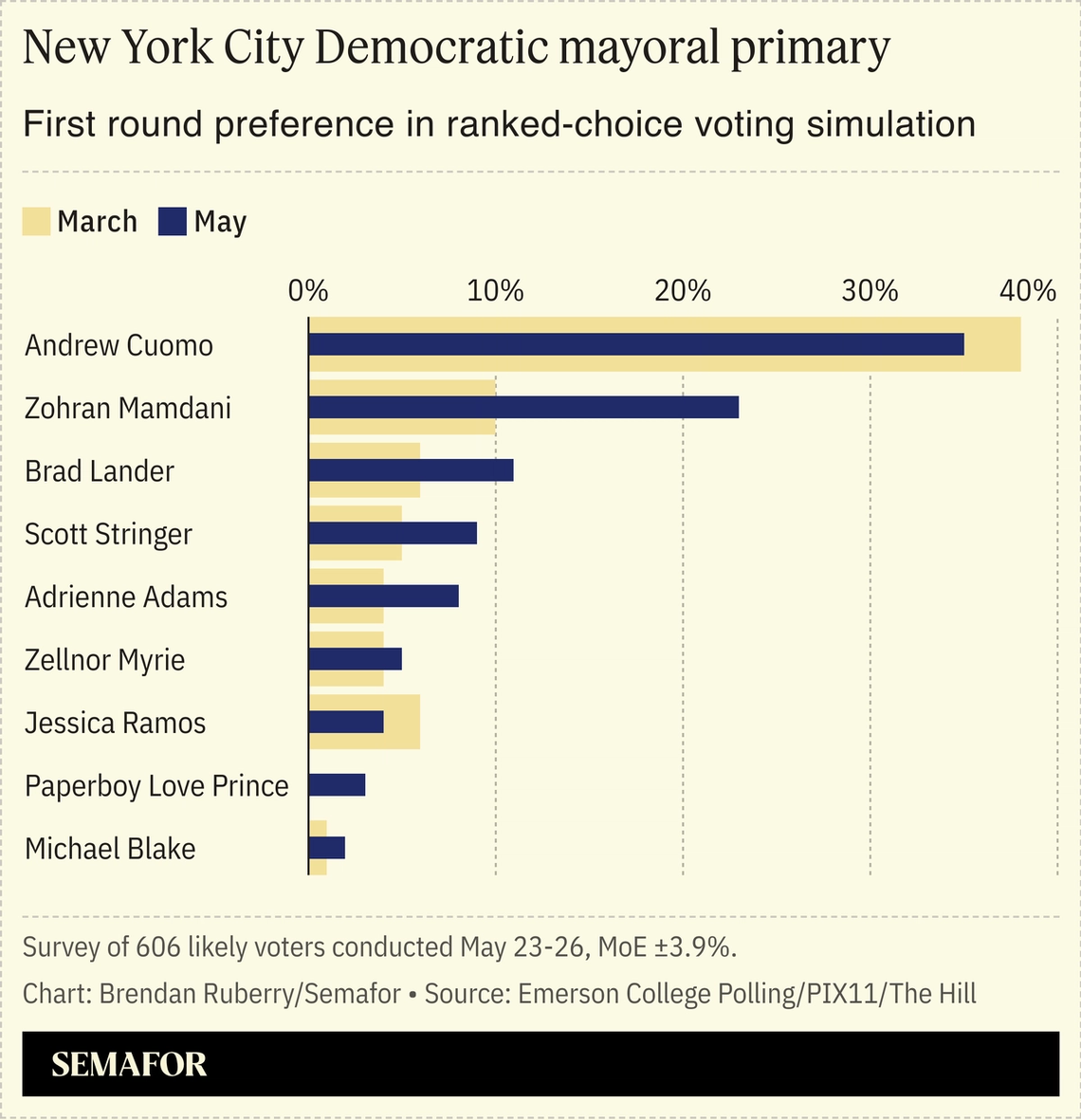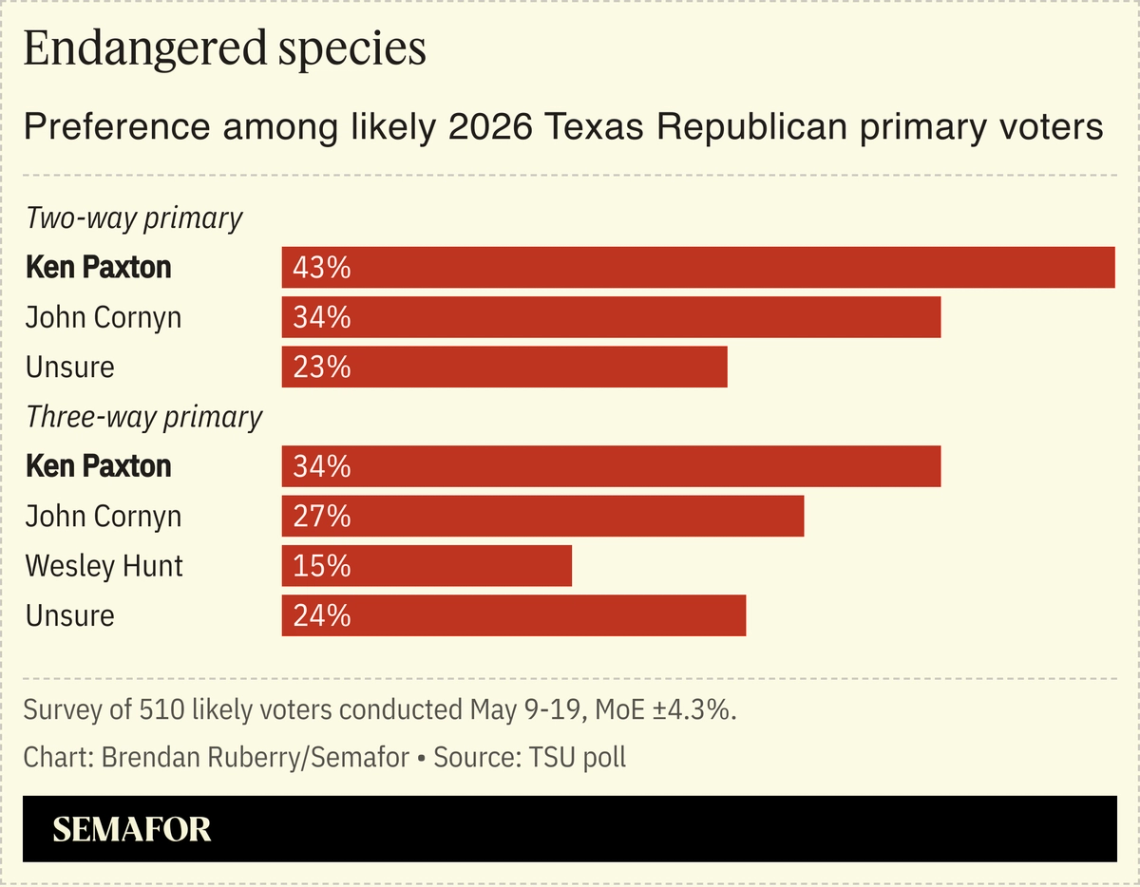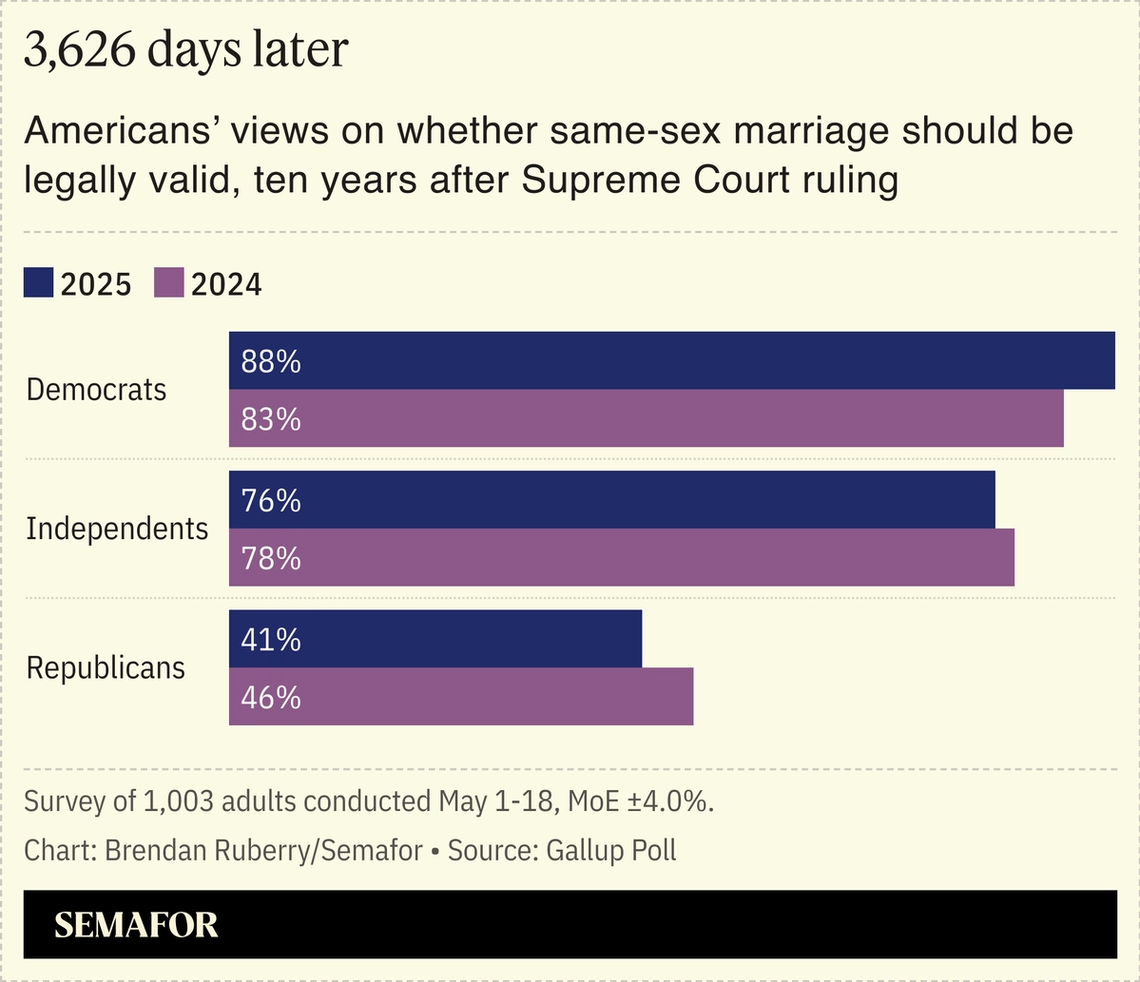 Polls Since Eric Adams quit the New York Democratic primary, and Andrew Cuomo entered it, the former governor has led every poll and won every modeled ranked-choice vote. This is the first time any other candidate — Mamdani — has kept the final Cuomo win margin under double digits. The socialist state legislator wins white voters, and he consolidates the progressive vote as candidates are eliminated, winning over Lander’s supporters by a 2-1 margin. The non-Cuomo candidates have gained ground since putting up TV ads; there is no evidence, right now, of Cuomo being helped by reporting that the Trump DOJ is investigating him. One factor to watch is who keeps running after the primary, and who rules that out. Cuomo has set up a party line that he could run on, if he loses the Democratic nomination; the Working Families Party, a constant thorn in Cuomo’s side, could give its line to Mamdani.  The one-time GOP Senate whip is the most endangered incumbent in his conference, polling well below 50% in a state that requires a runoff if no candidate gets a majority in the primary. Among likely Republican voters, his net favorable rating is 22 points — that’s less than half of Paxton’s, whose campaign is built around his own support for Trump and Cornyn’s belief that Trump couldn’t win in 2024. One in four Republicans say they could never vote for Cornyn, and just one in six say that of Paxton, who was impeached in 2023 and beat a long-running felony charge the next year. Hunt, who holds a safe seat near Houston, is considering a run, and a nonprofit and a pro-Hunt PAC have already run ads to build his name recognition. The theory: Cornyn’s vulnerable, but Paxton would be a weaker general election nominee, and this poll shows the attorney general only narrowly leading any Democratic nominee.  Fourteen years ago, for the first time, a majority of Americans told Gallup that they supported legalizing same-sex marriage. In 2022, support peaked at 71%. It has been falling since then, driven by Republicans, whose acceptance of same-sex marriage has dropped to its lowest level in nine years; their acceptance of “gay or lesbian relations,” is even lower, at 38%. This change isn’t due to Donald Trump, who supported legal same-sex marriage in all of his campaigns, and appointed a married gay man as his Treasury secretary. Some down-ballot Republicans do still oppose it, and in Virginia, Democrats are already using Lt. Gov. Winsome Earle-Sears’ opposition to it against her. Ads Buddy Carter for Senate/YouTube Buddy Carter for Senate/YouTube- Buddy Carter for Senate, “Offended.” Other Republicans are still considering a challenge to Sen. Jon Ossoff, but Carter, the congressman for Savannah, has grabbed early attention with a focus on trans politics. Ossoff’s vote against a “protect women’s sports” bill, a focus of Carter’s launch ad, gets 30 seconds to itself here, as an actor playing a “trans woman” worries about Carter’s MAGA cred, caresses trophies won “competing in women’s sports,” and marches to her Honda Fit with an Ossoff sticker. Ads on this theme are in vogue after their success last year, but Republicans don’t have the material that made 2024’s gender ads most effective: Sound of the candidate himself, talking about the topic.
- America Works USA, “Steady Leadership.” The Democratic Governors Association runs this spinoff group, funded by labor unions, spreading the word about incumbents’ accomplishments before they go back on the ballot. The quick pitch for Maryland’s Wes Moore, set in a Baltimore microbrewery, is that his budgets “made some smart cuts” and included “middle-class tax cuts.” There’s no mention of any of Moore’s progressive accomplishments; this is messaging that would work in a swing state, or a race against ex-Gov. Larry Hogan if he is enticed to run again next year. (Republicans would like to damage Moore’s image in case he runs for president, but have no strong 2026 contenders after Hogan.)
- One Giant Leap PAC, “Protect.” This super PAC, built to help Rep. Mikie Sherrill (D-NJ) win next month’s gubernatorial primary in New Jersey, is on clean-up duty. Newark Mayor Ras Baraka went after Sherill for donations she’d previously gotten from SpaceX employees (which she gave to charity) and family stock trades (which she had halted after negative attention). On The Breakfast Club, asked about the ad, Sherrill got tongue-tied and gave a halting defense. This ad doesn’t really deal with the content of the attack, either, saying only that “independent news sources” have praised her integrity, and that her opponents are lying “for political gain.”
Scooped!I keep muttering that we’re heading into our first post-literate election, one where anything not communicated in a short video will be missed by every winnable voter. Counter-point: Maybe we’re not. Lauren Egan’s read on “the Substack election,” in the Bulwark, catalogues the Democrats who’ve started free newsletters on the service, ending the brief period when progressives wanted to punish the company unless it got rid of racist pages. “The platform seems ripe not just for personal essays and reflections,” writes Egan, “but for 2028 primary candidates to post their policy platforms and engage in nerdy debates in the comments section.” It could be so much worse. Next - 11 days until primaries in New Jersey
- 18 days until primaries in Virginia
- 25 days until primaries in New York City
- 158 days until off-year elections
- 521 days until the 2026 midterm elections
David RecommendsThe Adam Friedland Show returned this week with an Anthony Weiner interview, sixty minutes of crosstalk, contempt, and one-upping. “You’re like the Lee Harvey Oswald of stories,” Weiner snaps after one of Friedland’s many interruptions. He yawns when the host tries to make a serious point about how his genitals changed “western civilization,” and mocks his “translucent” knowledge of politics. When Friedland gets a laugh out of him, there is an aura of shame, familiar to anyone who watched one of his apologetic press conferences; when Weiner lands a line he wants credit for it. “I would have been a better mayor than de Blasio,” he insists, after Friedland gets him talking about life on a sex offender registry. |